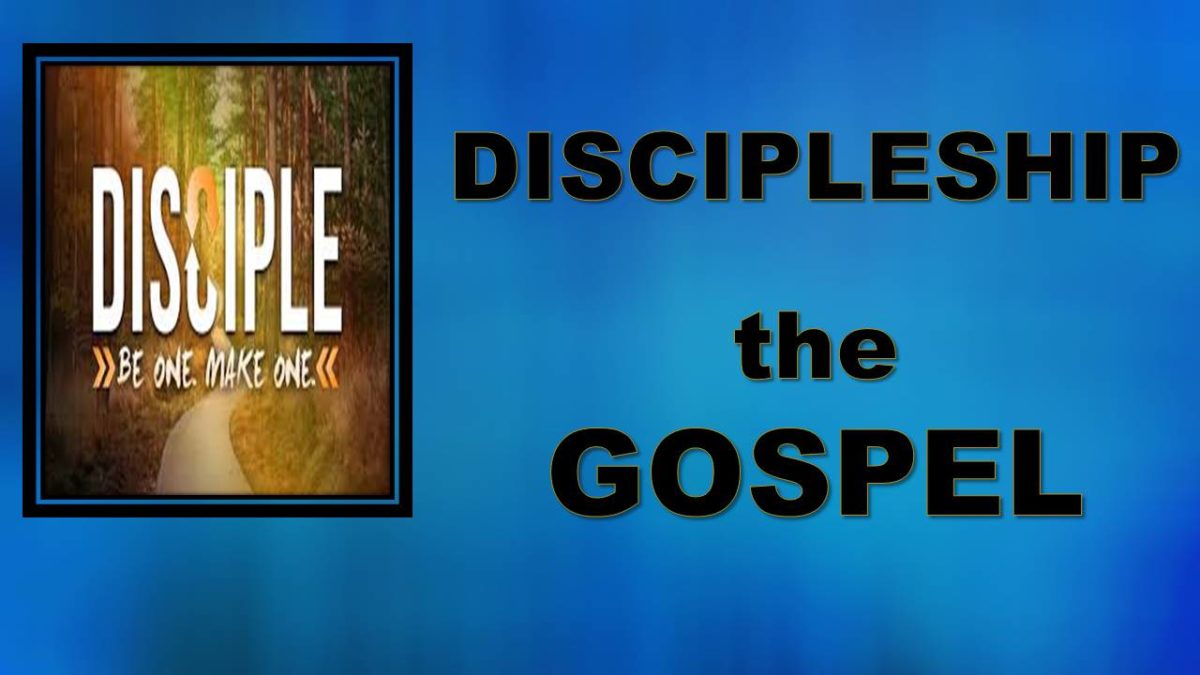There’s certain themes every healthy church comes back to, again and again. At Woodland you’ll hear us talk about the Gospel (every week, I hope). You’ll also hear us talk about the place of God’s Word, God’s plan of redemption (creation, fall, cross, consummation), the church as family, and our work as image-bearers in God’s world. You’ll also hear us talk about DISCIPLESHIP.
Discipleship is simply the business of following Jesus together. It’s arguably the main way we glorify God in the Christian life, and it takes place when somebody follows Jesus and takes somebody else with him or her. And, at the beginning of a new year, we need to revisit what this following Jesus together looks like. We need to go over again the core convictions about GOSPEL … GOD’S WORD … OUR IDENTITY …. AND DISCIPLING RELATIONSHIPS that make following Jesus together fruitful.
What the Gospel IS (1 Cor 15.3). In our life of discipleship together we need convictions about the Gospel. Generally speaking, the Gospel is all God’s work in Christ. It includes everything God the Father does through Jesus Christ, from His creation in the past through Jesus to the future rule of Christ. But, the heart of the Gospel is God’s work in Christ at the cross. Consider 1 Cor 15.3:
For I delivered to you as of first importance what I also received: that Christ died for our sins in accordance with the Scriptures.
Did you catch that? Can you count on one hand the words that describe what the Gospel is? CHRIST DIED FOR OUR SINS. Now, you can memorize that quickly, counting on your fingers maybe. But the challenge in our life together is going to be in how we think carefully about just how the Gospel works in our lives.
Tomorrow at Woodland there’s going to be a 75 pound metal disc on the platform. It’s a fly-wheel from a John Deer tractor, and it’s going to help us understand how the Gospel works in our life of discipleship together. This big metal disc transfers power from the engine to the rest of the vehicle. You can attach other things to it (like the drive-shaft). And, once it gets going, it has momentum, and it’s very hard to stop. In the same way, everything God does in our lives He does through the Gospel of Jesus Christ.
What the Gospel DOES (Rm 1.16). Consider Romans 1.16:
For I am not ashamed of the gospel, for it is the power of God for salvation to everyone who believes, first for the Jew then for the Gentile.
First, the Gospel changes what I think. This happens when the power of the Gospel is hitched to GOSPEL TRUTHS that take their power from the Gospel. They’re truths that operate in the mind because of the Gospel, and they address our hopes, fears, dreams, and picture of reality that also exist in the mind.
Examples of how this works can be found in Romans 5.1; 8.1, 32; 15.13; and 1 Tim 1.10-11. Take Romans 8.1: There is therefore now no condemnation for those who are in Christ Jesus. What’s true, in this verse? That I’m in Christ Jesus, right? That’s the GOSPEL, the result of the work of Christ in Romans 8. Now, what else is true? That God deals with me according to His loving relationship with Jesus. That’s the TRUTH that Romans 8 hitches to the power of the Gospel.
My growth in the Christian life is largely dependent on my willingness and Spirit-led skill in making these connections. And, what is true of my thinking resulting form the Gospel is also true of my behavior. Examples of how the Gospel changes what I do can be found in 1 Cor 6.18-20; 2 Cor 8.7-9; Gal 2.14; Eph 4.32, 5.25; Phil 1.27; and Titus 2.1. So, in 1 Cor 6.19b:
… You are not your own, for you were bought with a price. So glorify God in your body
What’s true here? That we were bought with a price. There’s the Gospel, again. What ought to be true because that is true? That I need to glorify God in my body. That’s the Gospel BEHAVIOR that needs to be hitched to power of the Gospel, according to 1 Cor 6.
The Gospel is the power of God and central to following Jesus. And, while we’re learning to follow Jesus together all our thinking and behavior should increasingly flow our of the Gospel. And when we learn this God will start a disciple-making movement for His glory in our churches. It will be less like making snow, more like touching off an avalanche. Less like billowing smoke, more like a hot fire that burns cleanly. And, at the beginning of a busy year, we need to focus our thoughts and energies on disciples-making and the Gospel.
Here’s some questions that will help us measure our present effectiveness as disciples-makers with respect to the Gospel:
- How much time have you spent in thinking about how the Gospel actually works in our lives? (Have you ever read helpful contemporary authors like Tim Keller, Paul Tripp, or Jerry Bridges who work hard to apply the Gospel to life?)
- What other issues can you list that could be harnessed to the power of the Gospel?
- Who are you traveling with in an intentional, disciple-making relationship?
* While these message on discipleship are my own, I offer special appreciation to Mike Bullmore for his talks at the EFCA Forest Lakes District Pastor’s Conference, October 2019. Credit is given for the general contour of the messages, most of the Scripture examples chosen, and for the illustration of the fly-wheel.

